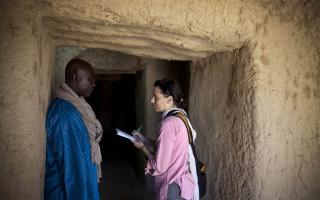E-Learning Curriculum for National Professional Officers
This is a self-paced modular programme for UN national professional officers both at headquarters and in the field.
The 2030 Agenda for Sustainable Development and UN management reform call on UN managers to lead effective teams, implement change and strengthen the support which the UN system provides to Member States.
In this context, UNSSC offers a dedicated online learning path for UN National Professional Officers.
Upon successful completion of the programme, participants will be able to:
- Explain the key characteristics of UN leadership and support the adoption of the leadership behaviours embodied in the UN System Leadership Framework.
- Explore all the necessary tools and core principles to apply results-based management in your project and programme management.
- Apply leadership communication to foster conversation and interaction.
- Develop and sustain an effective relationship with your supervisor that supports both of you working effectively.
- Articulate key concepts and practices of project management, and use tools and techniques to support project planning and implementation.
This programme follows learner-centered design and scenario-based learning. It is a self-paced learning path delivered entirely online.
Participants can start at any time and complete modules and activities at their own pace and sign-up for upcoming new modules.
The E-Learning Curriculum for National Professional Officers offers:
- A micro-learning experience characterized by small knowledge units (modules and micro-lessons) where participants consolidate and reflect on learning through the creation of micro-content (multi-modal forum replies, blog posts, etc.).
- Scenario-based learning exposing participants to unique real-life challenges and tasks of UN managers
- Consolidation of takeaways through reflective practices and social learning to facilitate information exchange and peer-to-peer learning
- Unlimited access to all modules for one calendar year from the date of enrolment.
The UNSSC dedicated e-learning platform tracks completion of individual modules. A final certificate will be released to participants who have completed all modules in the learning path.
Each module is estimated to require approximately three to four hours of self-paced study time.
This learning path forms part of Blueline, UNSSC's personalized learning hub. Subject to completion of this learning path, interested participants can sign up and access the Extended E-Certificate on Leadership and Management or other E-Learning Paths in Blue Line. Please contact emc@unssc.org for further information.
The E-Learning Curriculum for National Professional Officers includes the following modules:
- The UN System Leadership Framework
- Managing Up
- Project Management
- Leading through Communication
- Negotiation
- Managing for Results
- Introduction to Change Management
- Partnership
By completing the learning path, participants will have access to an exclusive alumni network for continuous learning and exchange.
UN National Professional Officers at headquarters and in the field.
The $750 fee covers access to all e-learning modules included in this programme for one calendar year from the date of enrolment.




